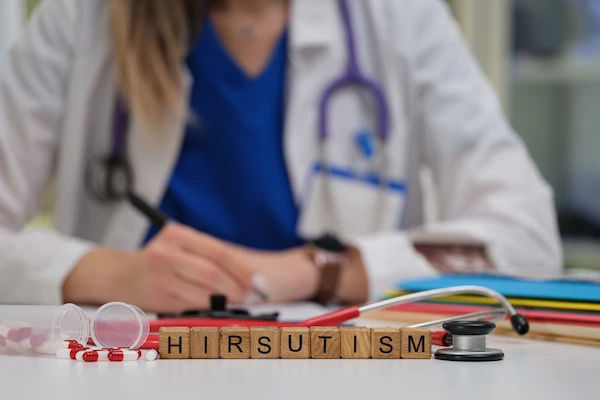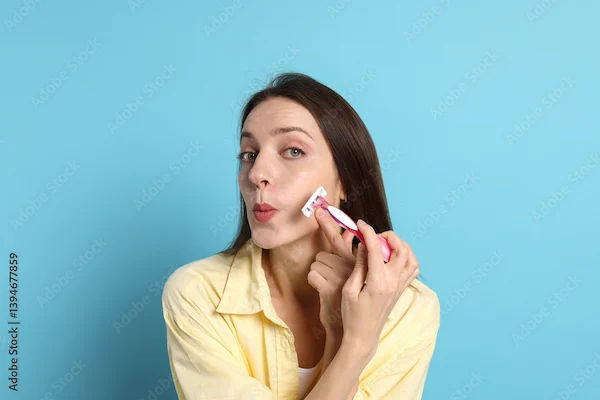Hirsutism: Causes And Treatment
Hirsutism causes excessive hair growth in women due to hormonal imbalances. Learn about its causes, symptoms, and treatment options, including medical therapies and natural remedies for effective management.

Written by Dr.Sonia Bhatt
Last updated on 13th Jan, 2026

Introduction
Hirsutism is a condition where women or people assigned female at birth (AFAB) experience excessive hair growth in areas typically associated with men, such as the face, chest, and back. This condition can have both physical and emotional effects, often leading to distress and self-consciousness. In this article, we'll dive into the causes of hirsutism, its symptoms, and the treatment options available to help manage it.
What is Hirsutism?
Hirsutism is characterised by excessive hair growth that follows a male-pattern distribution. This means hair may appear in places where men typically grow hair, like the upper lip, chin, chest, and back. While it’s normal for women to have some body hair, hirsutism involves darker, thicker, and coarser hair in these areas, which can be troubling for those affected. The condition is typically the result of an imbalance of hormones, specifically androgens (male hormones), or the increased sensitivity of hair follicles to these hormones.
Symptoms and Diagnosis
The primary symptom of hirsutism is the presence of coarse, dark hair in areas where women typically have fine or no hair. In addition to excessive hair growth, individuals with hirsutism may experience other symptoms related to underlying hormonal imbalances, such as:
Acne
Oily skin
Irregular menstrual cycles
Weight gain
Deepening of the voice
To diagnose hirsutism, healthcare providers typically perform a thorough medical history and physical examination. They may also order blood tests to measure hormone levels and imaging studies, such as ultrasound or CT scans, to evaluate the adrenal glands and ovaries for any abnormalities.
Get Your Hirsutism Symptoms Checked
Causes of Hirsutism
Hirsutism typically occurs due to hormonal imbalances or genetic factors that affect how the body produces or responds to androgens (male hormones). Below are some of the most common causes:
1. Polycystic Ovary Syndrome (PCOS)
PCOS is one of the most frequent causes of hirsutism. This hormonal disorder affects the ovaries, causing them to produce too many androgens. Women with PCOS often experience irregular periods, difficulty getting pregnant, and cysts on the ovaries. The excess androgens can stimulate hair follicles, leading to unwanted hair growth in areas like the face and chest.
2. Congenital Adrenal Hyperplasia (CAH)
Congenital Adrenal Hyperplasia (CAH) is a genetic condition that impacts the adrenal glands, causing them to produce excessive amounts of androgens. The severity of CAH can vary, but in women, it often results in hirsutism and, in some cases, ambiguous genitalia at birth or irregular periods.
3. Cushing's Syndrome
Cushing's Syndrome occurs when the body is exposed to high levels of cortisol for prolonged periods. This hormone imbalance can lead to an increase in androgen levels, contributing to hirsutism. Cushing's Syndrome can result from long-term use of corticosteroid medications or from tumours that produce cortisol.
4. Androgen-Secreting Tumors
In rare cases, tumours in the adrenal glands or ovaries that produce excess androgens can cause hirsutism. These tumours may be benign or malignant and can cause a sudden onset of symptoms. A prompt medical evaluation is necessary for proper diagnosis and treatment.
5. Medications
Some medications can lead to higher androgen levels, resulting in hirsutism. Anabolic steroids, certain birth control pills, and medications used to treat conditions like endometriosis are examples. If medication is the cause, talking to a healthcare provider about alternative treatments is important.
6. Obesity
Being overweight or obese can contribute to hirsutism due to the way excess fat influences hormone production. Fat cells can increase insulin production, which in turn stimulates the ovaries to produce more androgens. Maintaining a healthy weight through diet and exercise may help reduce androgen levels and improve symptoms.
7. Idiopathic Hirsutism
Sometimes, hirsutism develops without any obvious underlying cause. This is called idiopathic hirsutism and is often believed to result from an increased sensitivity of hair follicles to androgens rather than elevated hormone levels. Idiopathic hirsutism tends to run in families and may have a genetic basis.
Treatment Options for Hirsutism
The treatment of hirsutism focuses on managing the underlying cause, reducing excessive hair growth, and addressing any associated symptoms. Treatment options can be broadly categorised into medical, cosmetic, and lifestyle interventions.
Medical Treatments
Several medications can help reduce androgen levels and improve hirsutism symptoms. These medications include:
Oral Contraceptives: Oral contraceptives (birth control pills) are commonly prescribed to women with hirsutism, especially those with PCOS. They work by regulating the menstrual cycle and reducing the production of androgens by the ovaries. Oral contraceptives can also help improve acne and oily skin.
Anti-Androgens: Anti-androgen medications, such as spironolactone and finasteride, can block the effects of androgens on hair follicles, reducing hair growth in androgen-sensitive areas. These medications are often used in combination with oral contraceptives for better results. It is important to note that anti-androgens should not be used during pregnancy due to the risk of birth defects.
Insulin-Sensitizing Agents: For women with hirsutism and insulin resistance, such as those with PCOS, insulin-sensitizing agents like metformin can be beneficial. These medications help improve insulin sensitivity, which can reduce androgen production and improve symptoms.
GnRH Agonists: Gonadotropin-releasing hormone (GnRH) agonists are medications that suppress the production of androgens by the ovaries. They are typically used in severe cases of hirsutism when other treatments are ineffective. Long-term use of GnRH agonists can have side effects, including bone loss, so they are usually prescribed for short durations.
Cosmetic Treatments
Cosmetic treatments focus on removing or reducing the appearance of excessive hair. These treatments include:
Shaving and Plucking: Shaving and plucking are simple and inexpensive methods for removing unwanted hair. However, they can cause skin irritation and ingrown hairs, and the results are temporary.
Waxing and Sugaring: Waxing and sugaring involve applying a sticky substance to the skin and then removing it along with the hair. These methods provide longer-lasting results compared to shaving and plucking but can be painful and cause skin irritation.
Depilatory Creams: Depilatory creams contain chemicals that dissolve the hair shaft, allowing it to be wiped away. These creams are easy to use and provide longer-lasting results than shaving, but they can cause skin irritation in some individuals.
Laser Hair Removal: Laser hair removal uses concentrated beams of light to target and destroy hair follicles. This method provides long-lasting results and can significantly reduce hair growth over time. Multiple sessions are usually required, and the treatment can be expensive.
Electrolysis: Electrolysis is a permanent hair removal method that involves inserting a fine needle into the hair follicle and applying an electric current to destroy it. Electrolysis is effective but time-consuming and may require multiple sessions to achieve desired results.
Lifestyle Modifications
Making certain lifestyle changes can help manage hirsutism and improve overall health. These changes include:
Weight Management: Maintaining a healthy weight can help reduce androgen levels and improve hirsutism symptoms. A balanced diet and regular exercise are essential for weight management and overall well-being.
Diet and Nutrition: A diet rich in fruits, vegetables, whole grains, and lean proteins can support hormone balance and reduce insulin resistance. Avoiding processed foods and sugary beverages can also help improve symptoms.
Stress Management: Stress can exacerbate hormonal imbalances and worsen hirsutism symptoms. Incorporating stress-reducing activities, such as yoga, meditation, and deep breathing exercises, can help improve overall health and well-being.
Consult Top Gynaecologists For More Treatment Options
Conclusion
Hirsutism is a condition that can have significant physical and emotional impacts. Understanding the underlying causes and exploring various treatment options can help manage symptoms and improve quality of life. If you are experiencing excessive hair growth, it is important to consult a healthcare provider for a thorough evaluation and personalised treatment plan. By addressing the root cause and implementing appropriate interventions, individuals with hirsutism can achieve better control over their condition and enhance their overall well-being.
Get Your Hirsutism Symptoms Checked

Dr. Mona Yadav
Obstetrician and Gynaecologist
19 Years • MBBS, MD (Obstetrics & Gynaecology)
Dombivli
Nulife multispeciality, Dombivli

Dr. Parul Sharma
Obstetrician and Gynaecologist
8 Years • MBBS, MS (Obstetrics & Gynaecology)
New Delhi
THE DOCTORS NESST, New Delhi

Dr. Debajyoti Goswami
Obstetrician and Gynaecologist
10 Years • MBBS,D.G.O(DNB),Adv. Infertility Tech.(AIIMS),Fellowship in Diabetes(U.K),Comprehensive Abortion Care(Govt. Of W.B), Certificate in Clinical Embryology(AIIMS, BHUBANESWAR)
Bankura
D.G Clinic, Bankura
(25+ Patients)
Dr. K Anusha
Obstetrician and Gynaecologist
4 Years • MBBS, DGO
Yemmiganur
SRINIVASAA HOSPITAL, Yemmiganur

Dr. Asha Rani Singh
Obstetrician and Gynaecologist
24 Years • MBBS DGO
Delhi
Dr Asha Rani Singh Clinic, Delhi
Consult Top Gynaecologists For More Treatment Options

Dr. Mona Yadav
Obstetrician and Gynaecologist
19 Years • MBBS, MD (Obstetrics & Gynaecology)
Dombivli
Nulife multispeciality, Dombivli

Dr. Parul Sharma
Obstetrician and Gynaecologist
8 Years • MBBS, MS (Obstetrics & Gynaecology)
New Delhi
THE DOCTORS NESST, New Delhi

Dr. Debajyoti Goswami
Obstetrician and Gynaecologist
10 Years • MBBS,D.G.O(DNB),Adv. Infertility Tech.(AIIMS),Fellowship in Diabetes(U.K),Comprehensive Abortion Care(Govt. Of W.B), Certificate in Clinical Embryology(AIIMS, BHUBANESWAR)
Bankura
D.G Clinic, Bankura
(25+ Patients)
Dr. K Anusha
Obstetrician and Gynaecologist
4 Years • MBBS, DGO
Yemmiganur
SRINIVASAA HOSPITAL, Yemmiganur

Dr. Asha Rani Singh
Obstetrician and Gynaecologist
24 Years • MBBS DGO
Delhi
Dr Asha Rani Singh Clinic, Delhi

